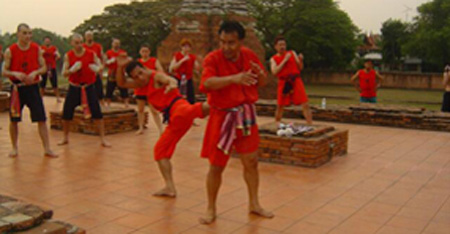|
History
Muay Thai is
the national sport of Thailand and is one of the most popular sports in the
world today. From the past till present, Muay Thai is considered as a
cultural heritage of the nation.
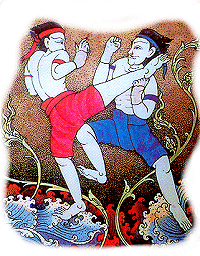
HISTORY OF MUAY THAI
Characteristics of Muay Thai
Muay Thai is a combative sport which allows
the use of almost all bodily organs, e.g., head, hand (fist), foot, knee,
and elbow, as weapons in combat. Furthermore, it is an art demonstrating
ability in moving various parts of the body in combat and self-defense to
the accompaniment of music. It is a kind of sport that develops functional
efficiency in the body systems, as well as mental development and
self-confidence. It can be very useful in daily life since Muay Thai
requires prompt decision making. Those who train consistently in Muay
Thai will be enabled
to make good swift decisions to solve their problems effectively.
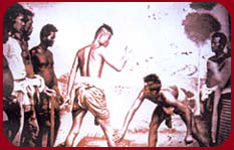
Muay Thai is an individual unarmed combat activity,
therefore a high level of fitness, both physical and mental must be reached
through consistent training. The combat may be
fatal, particularly when the training is inadequate, and therefore the
competitors must strictly follow the rules and regulations as well as having good manners and sportsmanship.
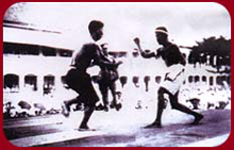
Value of Muay Thai
Training in Muay Thai promotes physical, mental, emotional, and social
development as well as transmitting and preserving
Thai culture. It is a
form of martial art that can be used for self-defense if endangered.
In
addition, good fighters can earn a lot of money, many competitors receive
hundred thousand Baht for each fight.
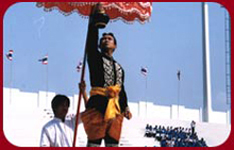
Customs to be observed by Muay Thai Trainees
Manners to which the Trainees must strictly
adhere are the demonstration of respect and gratitude to their
teachers who have imparted the knowledge to them and performing a ritual of
acceptance before beginning
training.
Furthermore, newcomers must pay respect to
their seniors and not fight against others taught by the
same teacher.
The trainee swears to observe
these things at the ritual of acceptance. In
addition, the trainee must
be very
patient, attentive and obedient since accidents are otherwise likely to
occur throughout the training.
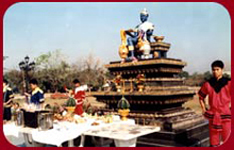
Muay Thai is a martial art that allows the use of various bodily organs for
fighting. It originated in Thailand
long ago and can be traced back to the Sukhothai
period that is about 800 years ago. It is now
practiced
all round the
world and sometimes referred to as Thai Boxing, but should not be called
Kick Boxing.
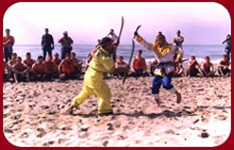
top
Muay Thai has been part of
military training since ancient tomes to supplement the use of sword and
pike in war. It was also
employed for recreation, exercise, and self-defense. There are always Muay
Thai
contest at annual festivals particularly in those for charity.
Muay Thai was one of the skill of kings in the old times, Pra Chao Sua, a king in the Ayudhya period,
often visited villages incognito to challenge local
fighters in order to find recruits.
There are
three main historic people of Muay Thai;
Phra Chao Sua or the Tiger King,
Nai KhaNomTom, the great fighter and
Phraya Pichai Dab Hak, the great warrior of
Thonburi period.
They are the heroes who raise the legend of
Muay Thai especially Nai KhaNomTom who could win ten Burmese opponents
without a rest in a contest. It can be said that if Thailand doesn't have
these people, Muay Thai may lose its history and legend.
According to the
Department of Fine Arts, Nai Khanom Thom, who was captured by the Burmese during the fall of Ayudhya,
defeated ten Burmese fighters consecutively in a contest on March 17, 1770. The day is now commemorated as
"Muay Thai Day"
In 1972, the Ministry of the Interior legislated for the Regulation of Conditions for
Permitting Betting in Boxing and Wrestling in
accordance with the Betting Act B.E.2470(1927). The
rules ofcompetition were established by the Department of Physical Education and have been effective
from April I, 1937.Since 1963 the Department of Physical Education had set the curricula for physical
education teacher training. The Third Class Certificate in Physical Education required the
competition of seven subjects, namely Track and Field Sports, Calisthenics, Teacher's Ethics, Boy
Scouts, Health Education and first aid. The First Class Certificate in
Physical Education required 4 out of 6 addition subjects, i.e. Sword and
Pike Fighting, Judo, Gymnastics, Fencing, Muay Thai, and Boxing. Muay Thai has become a professional sport since the promotion of contests at the Suan Kularb Ring.
The audience, sat or stood
around the ring which was in
the ground and was 20 metres in size.
The
contestants tied their hands with strips of cotton, wore "Mongkon" at the
head and armbands on both arms. The first stadium for professional Muay
Thai,
Rajadamnoen stadium, was opened on December 23, 1945. The
Rules have been revised, and some equipment for injury-prevention has been introduced.Muay Thai has been a sport
for competitions since 1971.
The first competition was held in Bangkok with competitors from five
institutes: Srinakarin University: the Colleges of Physical Education at
Chiang Mai, Maha Sarakham, Yala, and Chon Bun. Muay Thai was one of the
competitive sports in the Thai national Games was in 1993 at Khon Khaen.
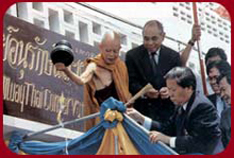
Luang Pho Koon Parisutho
Opening New Signs For International Amateur Muay Thai Federation and Muay
Thai Conservation and Promotion Center on 14 March 1996 at The National
Stadium Greeting by Mr. Kwang Robcob Director General of Physical Education
Civil Servants, and Hundreds of Peoples
top
Techniques
The
characteristic of Muay Thai depends on the master movements called "Mae Mai"
used in the fighting as well as techniques, training and experiences of
fighters. Mae Mai Muay Thai means the styles of fighting with one's own
fists, feet, knees and elbows to protect oneself. The senior masters
classified Mae Mai Muay Thai into 15 movements named as follow:
Sa Lap Phan
Pla
(the master of
basic movement used to escape outside in order to perform other techniques)
Paksa Waek
Rang
(the master of
movement at close quarter used to fight with other techniques)
Java Sad
Hok
(the master
movement used to side step out of the straight punch and counter by the
elbow)
I-nao Taeng
Krich
(the master
movement used to block the straight punch by fighting with elbow at close
quarters)
Yok Kho
Phra Sumaru
(the master
movement used to defend the straight punch at close quarters by letting the
punch pass over the head while throwing the punch at the chin)
Ta Then
Kham Fak
(the basic
movement used to defend the upper punch by pushing the punch out the arm)
Mon Yan Lak
(the master
movement used to defend the fists by pressing against the top of the chest
or the abdomen)
Pak Luk
Thoy
(the master
movement used to defend the kick by throwing the elbow to the shin)
Jorakae Fad
Hang
(the master
movement used to attack the opponent when he loses his balance by turning
the body and throwing the swinging back kick to the kidney)
Hak Nguang
Aiyara
(the master
movement used to defend the kick by throwing the elbow to the hamstring)
Naka Bid
Hang
(the master
movement used to defend the kick by twisting the tip of foot with both hands
and striking the knee to break it)
Wirun Hok
Klab
(the master
movement used to defend the kick by throwing the heel to the calf)
Dab Chawala
(the master
movement used to defend the straight punch by throwing the punch to the
face)
Khun Yak
Jub Ling
(the master
movement used for basic training--the attacker attacks by throwing a suit of
punch, elbow and kick and the defender counters by a suit of punch, elbow
and kick as well)
Hak Kho
Aiyara
(the master
movement used for walking forwards to pull the opponent down in order to
throw the knee up to the face or the chest of the opponent.)
Apart from the
master movements as said above, there are a lot of techniques of Muay Thai,
which derived from the past to the present.
There is a very well known saying regarding Muay Thai
technique:
'Kick loses to
punch,
punch loses to
knee,
knee loses to
elbow,
elbow loses to
kick'
A never-ending
circle encapsulating the fact that you must practice and master all of the
Muay Thai weapons.
top |
